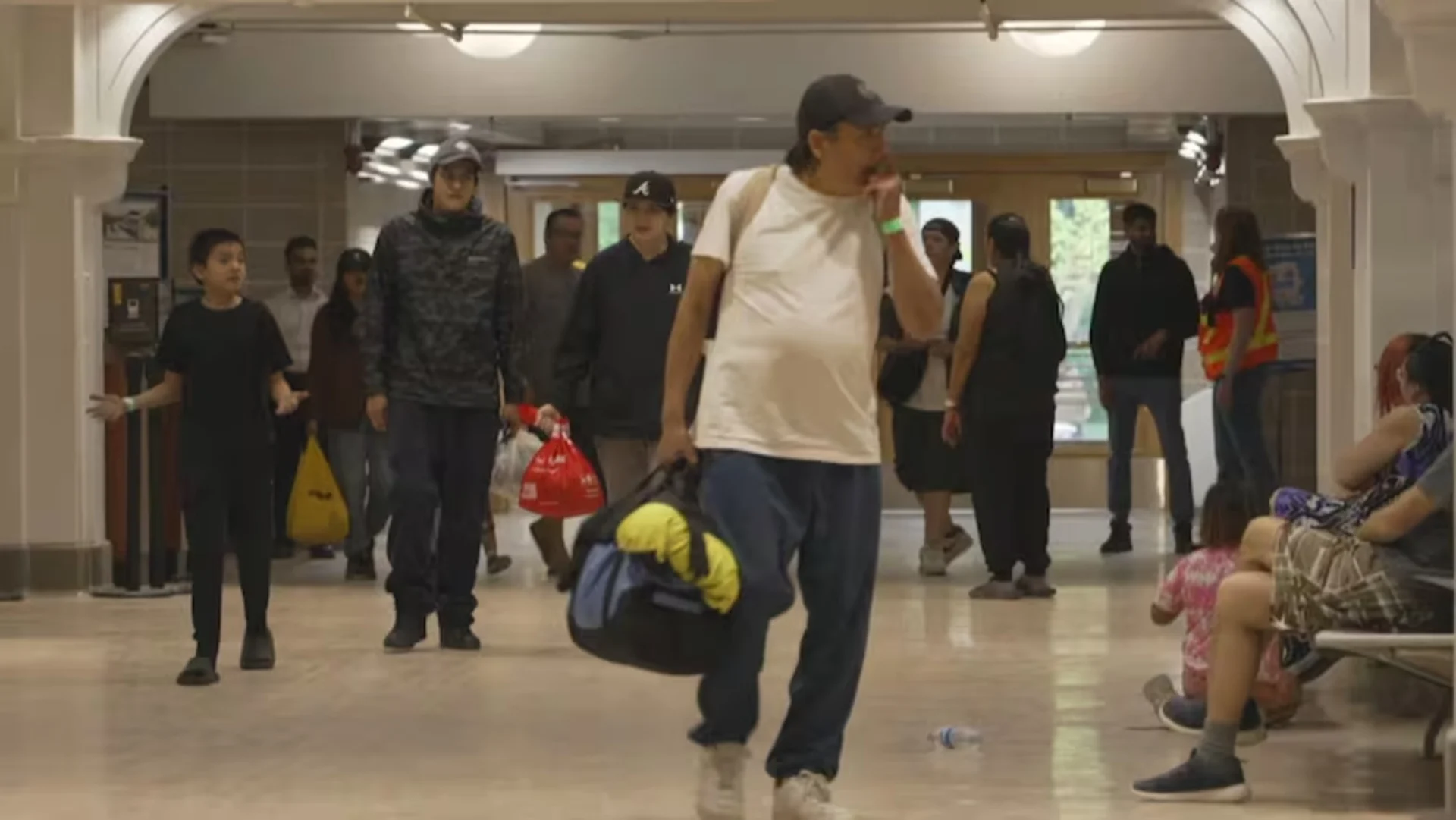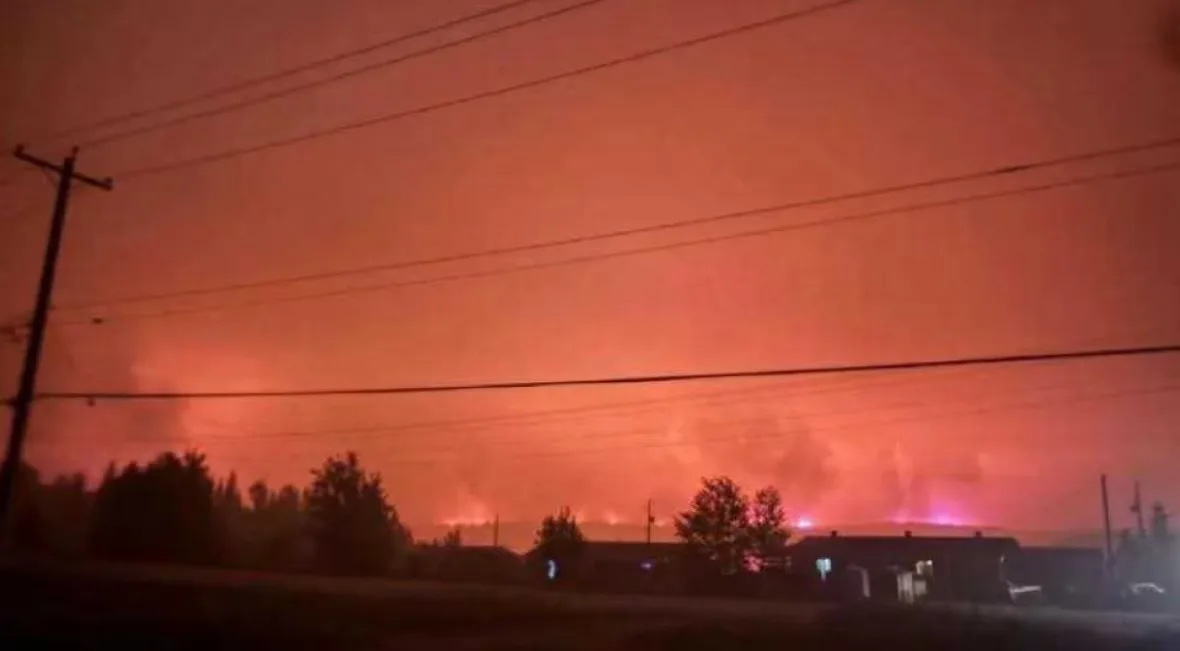
Pukatagawan residents arrive in Winnipeg as evacuation continues
Dozens of Pukatawagan residents who took a nearly 16-hour train ride to Winnipeg were among the latest to escape the community days after a wildfire forced the evacuation of the northern Manitoba First Nation.
A Via Rail train carrying about 120 wildfire evacuees — most of them from Pukatawagan — arrived in Winnipeg from The Pas around 7:30 p.m. CT Saturday.
Pukatawagan is about 700 kilometres northwest of Winnipeg, as the crow flies. The fire near the community was about 9,800 hectares in size as of the province's latest fire bulletin Saturday.
DON'T MISS: The Weather Network's wildfire hub
River Caribou said the journey on the train was the end of a chaotic exit from the community, which has been under an evacuation order since Wednesday, when the Manitoba government declared a provincewide state of emergency.
"Everybody was in an alarm," Caribou said. "We were put into The Pas and they accommodated us into an arena.… We were there for about maybe 12 hours and then we boarded the train to Winnipeg."
Premier says some evacuees heading to Ontario
The Manitoba government said it expected more than 17,000 people to be evacuated from their communities when it declared the state of emergency, with the majority coming to Winnipeg.
Premier Wab Kinew, who was at Winnipeg's Pride Parade Sunday, said about 3,500 evacuees will be heading to hotels in southern Ontario, with around 300 leaving for that province on Sunday.
"We'll have a bunch of rooms coming online [in Manitoba] on Tuesday," Kinew said at the parade. "Today, we're focused on moving people out of Pukatawagan and Norway House and folks from Split Lake who are in Gilliam right now. But when we're talking about the fire fight … it's a really intense day overall."

A Via Rail train carrying about 120 wildfire evacuees — most from Pukatawagan — arrived in Winnipeg from The Pas at around 7:30 p.m. CT on Saturday. (Radio-Canada)
During an unrelated event in Calgary Sunday, Prime Minister Mark Carney thanked volunteers, first responders, and federal and provincial officials for their efforts in Manitoba, Saskatchewan and Alberta.
"These forest fires have been very, very challenging: remote communities, isolated, need for large-scale evacuations," Carney said. "The good news is those are proceeding well at this stage, but of course it's not over til it's over and we're at the start of the forest fire season across the country."
Chinook flights continue
Mathias Colomb Cree Nation Coun. Kelly Linklater said about 1,300 people had been moved out of Pukatawagan as of Sunday morning, but there's still more than 1,000 who still need to be evacuated. Pukatawagan is the main community in Mathias Colomb Cree Nation.
"As of this morning, there are three Chinooks that are going up there," Linklater said Sunday during an interview on Rosemary Barton Live. "Fortunately, the winds have changed and moved. Two days ago, they were moving into the community."
The Canadian Armed Forces began flying out Pukatawagan residents on Chinook helicopters on Saturday.
Pukatawagan's only airstrip — which shut down on Thursday because of heavy smoke — reopened Saturday morning, but the First Nation's chief Gordie Bear the runway is too small to accommodate large aircraft.
Cornelia Colomb said she got on a helicopter Saturday afternoon.
"There's times that you look out the living room window, you could see the flames," she said.
"Keeping the family together was our [first] priority and keeping calm was our second."
Linklater said the First Nation's leadership expected evacuation efforts to wrap up Sunday. Evacuees have also been transported to Portage La Prairie, Brandon and The Pas.
Opaskwayak Cree Nation near The Pas opened up its hall and arena to accommodate some evacuees.

Smoke forced the closure of Pukatawagan's airport on Thursday. (Submitted by Leo Sinclair)
"We're in a position where we, of course, we're going to help," OCN Chief Maureen Brown said Saturday.
"We've actually had to build the makeshift emergency hospital room at our local hall. I'd like to give a shout out to our teams that assemble so efficiently."
OCN begins voluntary evacuation due to smoke
But on Sunday, that First Nation announced it was starting voluntary self-evacuation due to poor air quality in the region.
A wildfire about five kilometres west of the community and neighbouring The Pas — first reported almost a month ago — was more than 40,000 hectares in size as of Saturday, according to the province's FireView map. The fire was declared to be under control on May 23.
OCN said in a news release the voluntary self-evacuation is specifically for elderly residents and people with pre-existing medical conditions.
It said the community is not in any danger due to wildfires, but that air quality is expected to fluctuate in the coming days.
Tracy Dumas has been volunteering to help out people as they arrived in Winnipeg, making sure they have food and a place to stay.
"People were limited to stuff so they need clothes," she said. "They need hygiene stuff. They need underwear, socks."
WATCH: How animals cope with wildfires — in the days and years after the burn
The story was originally written by Arturo Chang and published for CBC News. With files from Josh Crabb, Gavin Axelrod and Radio-Canada's Yasmine Mehdi